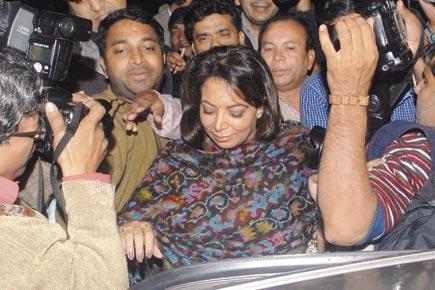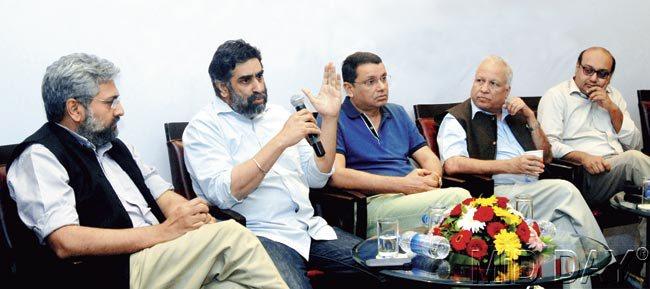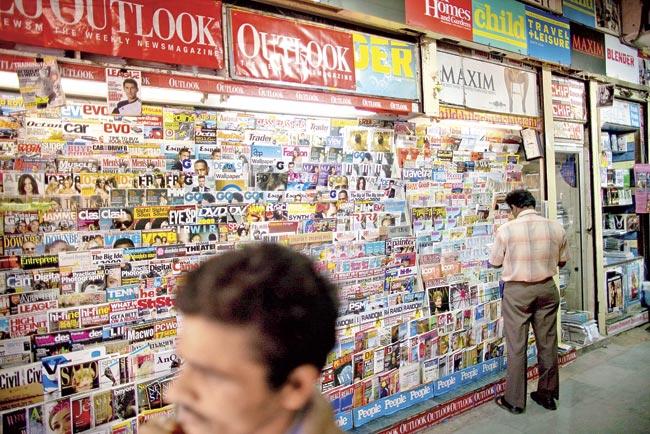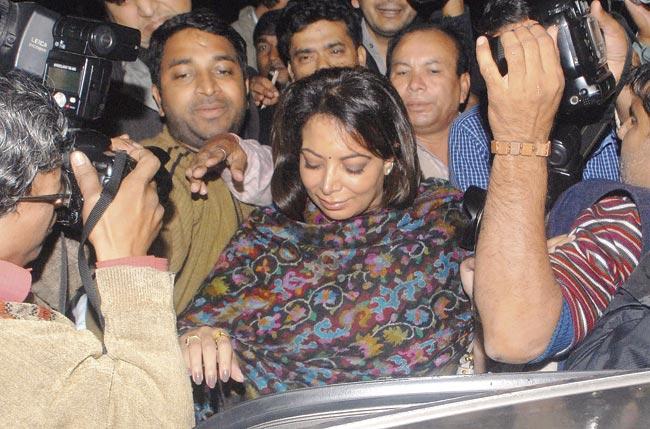With the removal or resignation of several newspaper and magazine editors in recent times, the question of ownership pressure and journalistic integrity has been a point of debate. The Mumbai Press Club organised a panel to discuss this, on Thursday

In the last few weeks and months, journalism has seen an unusual enemy. The crisis within. Open Magazine political editor was forced out because of a series of political articles he wrote were not appreciated by the politicians he criticised. The Hindu lost its first professional editor and CEO as they fell victims to ownership manoeuvres. The list goes on. And as the Lok Sabha elections near, the ugly face of paid news will become even more pronounced.
ADVERTISEMENT

This was the Press Club Mumbai’s reasoning for organising its panel discussion on the crisis within journalism, titled The Elephant in the Room. In days gone by, journalism was practically synonymous with activism, and journalists were seen to be carrying out a public service as well as a social function, while disseminating information.

Scandals that rock the media world are only the tip of the iceberg (image for representational purposes). Pic/Getty Images
Those days have long passed. Newspapers and other media are struggling to stay viable in an era of social media, bloggers and citizen journalists. Increasingly, journalists are seen as employees of a business, like any other. This has naturally led to friction between ideals and realities, between the function of a journalist and the role that the publication owner expects him or her to play.

The case involving corporate lobbyist Niira Radia threw up questions of political and business influence on journalists
The issue was debated by former editor of The Hindu Siddharth Varadarajan, former editor of Open Hartosh Singh Bal, CEO of Star India Uday Shankar, editor of Divya Bhaskar Kumar Ketkar and former editor of Forbes Indrajit Gupta. Press Club president Gurbir Singh moderated.
Role models
Uday Shankar said there is a collapse of the editor as an institution. “The younger generation is inspired by role models, but where are the role models?” he asked. “The editor used to exist in an ivory tower. The day the editor started seeking a public profile, that is where the problem began to occur. The editor should be strong internally, and not visible externally. These days it is the other way round.”
Hartosh Singh Bal said that when the story of the Niira Radia tapes, exposing lobbying of journalists by business heads and politicians, was published, the publisher and owner knew nothing about it until it was actually printed. “We were asked why we had not contacted people about the story, but the story would not have appeared if we had!” he said, evoking knowing chuckles.
Bal said that the crisis over what the editor can and cannot do has little to do with the editor’s public visibility or otherwise; it is a problem related to the way the media is structured in this country. For media owners whose main business is not media, political and commercial considerations trump journalistic ones, he said. “The structural safeguards which should exist internally do not exist.”
Kumar Ketkar said that the current crisis of journalism is a reflection of the current crisis of Indian and global capitalism. “The capitalist class ownership profile has changed since the 1960s and ’70s. Foreign financial institutions are now trying to control the middle class investment, which was small in the ’70s. At that time even a textile mill owner could run a paper. Today it is a shopping mall culture. It is a crisis of capitalism as well as ideology,” he said.
Survival instinct
Siddharth Varadarajan said that there is a class of editors who have realised that it is in their own interests, if they want to survive and thrive, that they play by the rules set by the owner. “I have seen examples of journalists and editors who stand up to pressure. At the end of the day, everyone has to pick their fight. Even management has to pick their fight. It is a wider issue than whether the newspaper is corporate owned or family owned.”
Looking for remedies
Gurbir Singh remarked that the maximum the Press Council of India can do is censure erring publications. But it does not stop anything. So what is the remedy, he asked. Bal said, “We cannot work under the assumption that the only way journalism will be saved is by morally upright editors.
That is waiting for a future which will never come. You need to institutionalise certain functions in the editor which can only be done legally. In the existing framework we do not even examine whether the contracts we sign are legally valid. There has to be a corpus fund with a team of lawyers to help journalists, especially those from mofussil areas, who take on owners and big business.”
Indrajit Gupta said that there has never been a legal framework to support the unspoken code which is mutually understood among news professionals. “What was consensus needs to be legally framed and enforced,” he said. Kumar Ketkar said that the press as a business model is coming into deep crisis, with newspapers and some channels losing business.
“On the one hand you have a losing business, and on the other hand you want competent, talented and morally upright editors. This is mutually incompatible. I won’t be surprised if newspapers start closing within the next 10 years. It has already started happening in Europe, and we in India think we are different and it won’t happen here.”
Uday Shankar said there are no easy solutions. A legal framework would be desirable, he said, and there are many such regulations governing television. “But if anything, it has deepened the crisis and enhanced the distortions rather than solve any problems. So while a legal solution is desirable, I’m not sure that the experience in this country gives us confidence to adopt it.
We need to fix the business model of media. News is a small business. Everywhere in the world, it is about the number of committed viewers and readers and the amount of money they are willing to spend to consume your content. If news is profitable in the US, it is primarily because people are willing to pay enough to subscribe to a news channel.
We have moved away from the age where provision of news was itself a reason for people to come to you. That is happening free of cost from other sources. So we need to create an identity for our brand, whether newspaper or TV channel.
The trouble is that with the exception of a few newspapers and magazines, and a few people, there is nothing to distinguish one from the other, apart from the logo. They all deliver the same content in the same manner, and one’s willingness to pay for this is diminished. You have to create quality and a distinct identity, and not go for the largest number of eyeballs and readers.”
Shankar added, “Journalists have been in denial for too long that we want quality journalism, good salaries, good living conditions, decent offices, technology, and we won’t worry about how to fund it. We have to resolve the question of where the money comes from. It’s better that we as a community resolve this question rather than leave it to owners, politicians or bureaucrats.”
Talent
Shankar, touching on the question of talent among journalists, said, “We don’t have the resources to invest in talent. Every news channel, with the exception of Times Now which is part of a larger media group, is bleeding. If you make a bit of profit, you don’t have the appetite to pull that back into shoring up talent. The crisis isn’t looming, the crisis is here and now.
We are all talking about the big corporates coming in, and layoffs and acquisitions. Look at the alternative. If these guys had not come in, some of these companies would have folded up altogether. Instead of 300, there would have been a thousand people laid off.”
Siddharth Varadarajan remarked that while recruiting young journalists, he had got the sense that people aspire to do journalism addressing public concerns. “What drives young journalists is still what drove all of us. Disillusionment sets in when you see the process at work, and you realise that what you want to do doesn’t work. A lot depends on the work culture in a particular organisation.”
Gupta said, “Digitisation has enhanced the pressure on journalists by demanding more stories instead of letting them focus on quality. We see very few publications and newsrooms where young people are given the time and the resources and the required supervision to take an idea to a different level and reach their full potential.
We are turning an entire generation of journalists into automatons. That is the other crisis in our profession. Fundamentally journalism is a creative profession. What we are reducing it to is a mechanistic process, devoid of imagination, of risk-taking, or challenging people to raise the bar.”
Ownership
Shankar acknowledged that ownership issues are complicated, and media is no longer a low-investment, low-cost and low-returns business.
“One of the single biggest cost factors is talent. Earlier we did not have many options. We lived in a poor society, and journalism was one of the few options for someone of a liberal arts persuasion. Today the liberal arts graduate has many more options which are equally stimulating and satisfying, so journalism has much more competition.”
Varadarajan said that the reporter should be free to pursue stories without worrying about the ownership of the paper. Shankar added that further to this, if a publication is being set up and the editor doesn’t know who is behind it, that spells trouble. Bal remarked that the readers should also know the funding structure of the publication, and it should be transparent.
Shankar said, “Just because the media has become capital-intensive, doesn’t mean that it has to compromise on your integrity. Every business has to have a value system, and the editor needs to be sensitive to that. Journalists need to wake up to the economic reality, and it can’t be denied. On the other hand, those who recognise that are willing to swing to the other extreme and do anything. That also is neither healthy nor sustainable.”
 Subscribe today by clicking the link and stay updated with the latest news!" Click here!
Subscribe today by clicking the link and stay updated with the latest news!" Click here!







